Grand Hotel (1932) was an all-star drama, directed by Edmund Goulding and produced by Irving Thalberg for M.G.M. William A. Drake wrote the screenplay based on his own play Grand Hotel (1930) which in turn was based on the German novel Menschen im Hotel (1929) by Vicki Baum. The film won an Oscar for Best Picture and was a box office hit. The phrase "Grand Hotel theme" has come to be used for any film drama following the activities of various people in a large busy place, with some characters' lives overlapping in odd ways and some of them remaining unaware of one another's existence.
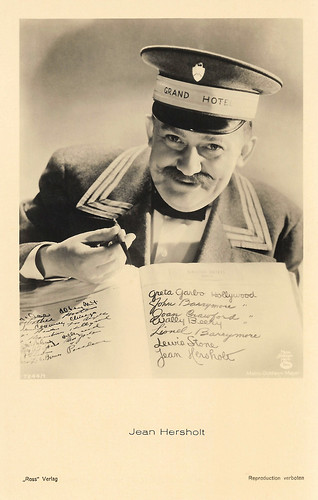
German postcard by Ross Verlag, no. 7244/1, 1932-1933, distributed in Italy by Casa Editrice Ballerini & Fratini, Firenze. Photo: Metro-Goldwyn-Mayer. Publicity still for Grand Hotel (Edmund Goulding, 1932) with Jean Hersholt.
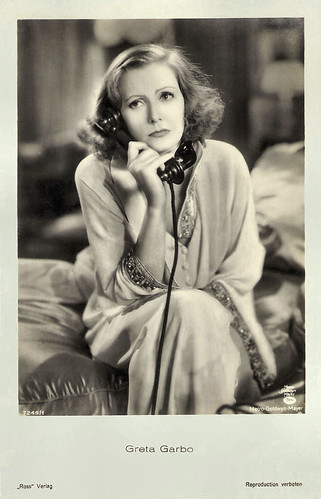
German postcard by Ross Verlag, no. 7249/1, 1932-1933. Photo: Metro-Goldwyn-Mayer. Publicity still for Grand Hotel (Edmund Goulding, 1932) with Greta Garbo.
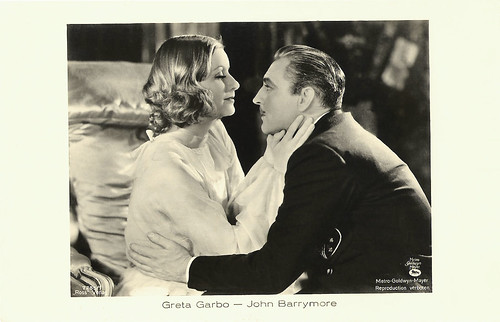
German postcard by Ross Verlag, no. 7285/1, 1932-1933. Photo: Metro-Goldwyn-Mayer. Publicity still for Grand Hotel (Edmund Goulding, 1932) with Greta Garbo and John Barrymore.
The setting for Grand Hotel (Edmund Goulding, 1932) is Berlin's plushest, most expensive hotel. Lewis Stone plays Doctor Otternschlag, a disfigured veteran of World War I, usually drunk and a permanent resident of the Grand Hotel. He observes: "People coming, going. Nothing ever happens". His statement proves to be false, as the film follows several guests over the course of one tumultuous day.
John Barrymore is Baron Felix von Geigern, who squandered his fortune and supports himself as a card player and occasional jewel thief. He befriends Otto Kringelein (Lionel Barrymore), a lowly bookkeeper who is dying and has decided to spend his remaining days in the lap of luxury. Kringelein's former employer, industrialist General Director Preysing (Wallace Beery), is at the hotel to close an important deal, and he hires stenographer Flaemmchen (Joan Crawford) to assist him. She aspires to be an actress and shows Preysing some magazine photos for which she posed, implying she is willing to offer him more than typing if he advances her career.
Another guest is the eccentric Russian prima ballerina Grusinskaya (Greta Garbo), whose career is on the wane. When the Baron is in her room to steal her pearls and she returns from the theatre, he hides in her room and overhears as she talks to herself about wanting to end it all. He comes out of hiding and engages her in conversation, and Grusinskaya finds herself attracted to him. The following morning, the Baron returns Grusinskaya's jewels, and she forgives his crime. She invites him to accompany her to Vienna, an offer he accepts.
The Baron is desperate for money to pay his way out of the criminal group he had been working with. He and Kringelein get a card game going, and Kringelein wins everything, then becomes intoxicated. When he drops his wallet, the Baron stashes it in his pocket, intending to keep the winnings. However, after Kringelein begins to search for his lost belongings, the Baron – who desperately needs the money but has become very fond of Kringelein – pretends to have discovered the wallet and returns it to him.
As part of a desperate merger plan, Preysing must travel to London, and he asks Flaemmchen to accompany him. Later, when the two are in her room, which opens on to his, Preysing sees the shadow of the Baron rifling through his belongings. He confronts the Baron; the two struggle, and Preysing bludgeons the Baron with the telephone, killing him. Flaemmchen sees what happened and tells Kringelein, who confronts Preysing. He insists he acted in self-defense, but Kringelein summons the police and Preysing is arrested.
Grusinskaya departs for the train station, expecting to find the Baron waiting for her there. Meanwhile, Kringelein offers to take care of Flaemmchen, who suggests they seek a cure for his illness. As they leave the hotel, Doctor Otternschlag again observes, "Grand Hotel. Always the same. People come. People go. Nothing ever happens."
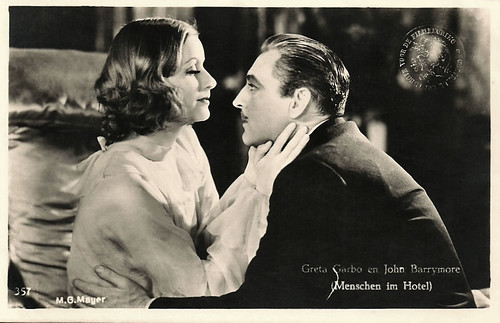
Dutch postcard, no. 357. Photo: Metro-Goldwyn-Mayer. Publicity still for Grand Hotel (Edmund Goulding, 1932) with Greta Garbo and John Barrymore. The subtitle mentions the German release title Menschen im Hotel, also the title of the book by Vicky Baum on which the film was based. The mark on the card is that of the Dutch Board of Film Censors.
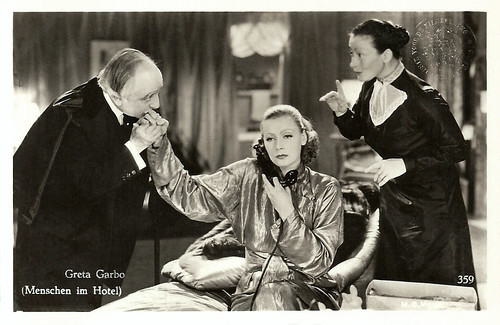
Dutch postcard, no. 359. Photo: Metro-Goldwyn-Mayer. Publicity still for Grand Hotel (Edmund Goulding, 1932) with Ferdinand Gottschalk (Pimenov), Greta Garbo (Grusinskaya) and Rafaela Ottiano (Suzette).
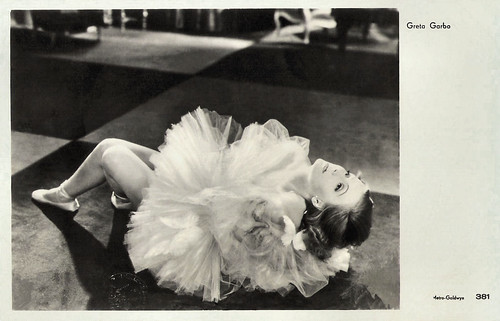
Dutch postcard by JosPe, no. 381. Photo: Metro-Goldwyn-Mayer. Publicity still for Grand Hotel (Edmund Goulding, 1932) with Greta Garbo.
Producer Irving Thalberg purchased the rights to Vicki Baum's novel Menschen im Hotel for $13,000 and then commissioned William Absalom Drake to adapt it for the stage. It opened on Broadway at the National Theatre on 13 November 1930 and ran for 459 performances. Pleased with its success, Thalberg had Drake and Béla Balázs write the screenplay and budgeted the project at $700,000.
Thalberg made it into MGM's first 'all star' film with an A-list of star performers: the divine Garbo, not one but two Barrymores, Wallace Beery, Joan Crawford, Lewis Stone, and with Jean Hersholt, Rafaela Ottiano and Ferdinand Gottschalk in sterling supporting roles. There was concern that putting so much talent into one film, instead of spreading the stars out over 4 or 5 films, would lose the studio money. But Grand Hotel (Edmund Goulding, 1932) was a great success, critically and financially.
Grand Hotel (1932) was seen as an artistic achievement in its art direction and production quality. The art director, Cedric Gibbons, was one of the most important and influential in the history of American film. The lobby scenes were extremely well done, portraying a 360° desk. This allowed audiences to watch the hotel action from all around the characters. It changed the way sets were made from that point onward.
Mordaunt Hall of The New York Times praised in 1932 the performances of Greta Garbo and John Barrymore, in a mostly positive review. "So far as the direction is concerned, Edmund Goulding has done an excellent piece of work, but occasionally it seems as though he relies too much on close-ups. Nevertheless he has sustained a steady momentum in darting here and there in the busy hostelry and working up to an effective dramatic pitch at the psychological moment. (...) Miss Garbo, possibly appreciating that she was supported by a galaxy of efficient performers, decided that she would do her utmost to make her role shine. And she succeeds admirably. She is stunning in her early scenes and charming in the love scene with Baron Geigern, portrayed by John Barrymore with his usual savoir faire."
More than 80 years later, Ron Oliver reviews at IMDb: "Watch how the plot weaves the threads of the characters' lives into a finished tapestry. One of the great movies. Tremendously satisfying." And Richard Gilliam at AllMovie adds: "Grand Hotel is the prototype for the all-star ensemble film and an excellent example of the rich and glamorous escapist entertainment, often from MGM, that took on enhanced prominence during the Depression. Produced by Irving Thalberg using top-end ingredients and state-of-the-art technology, it is yet another example of MGM's dominance during the 1930s for this type of film."
At the time of the shooting, there was some controversy about Greta Garbo, with her strong Swedish accent, impersonating the Russian dancer Grusinskaya, played on the stage by Eugenie Leontovich. She delivers the line "I want to be alone" and, immediately following, "I just want to be alone." Soon after, in conversation with Baron Felix von Gaigern (John Barrymore), she says "And I want to be alone." Referring to its legendary use as a characterisation of her personal reclusive life, Garbo later insisted, "I never said I want to be alone; I only said 'I want to be let alone.' There is all the difference.
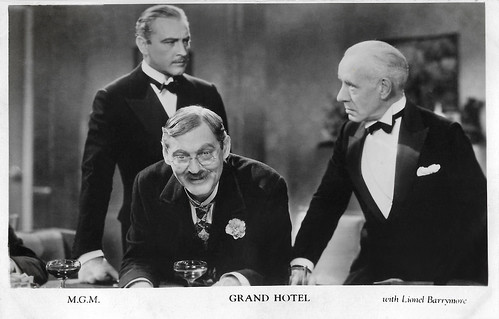
British postcard by Film Weekly. Photo: M.G.M. Publicity still for Grand Hotel (Edmund Goulding, 1932) with Lionel Barrymore, Lewis Stone, and John Barrymore.
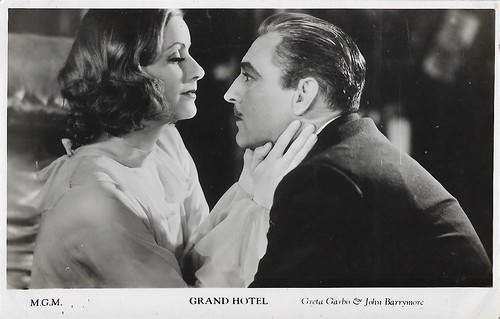
British postcard by Film Weekly. Photo: M.G.M. Publicity still for Grand Hotel (Edmund Goulding, 1932) with Greta Garbo and John Barrymore.
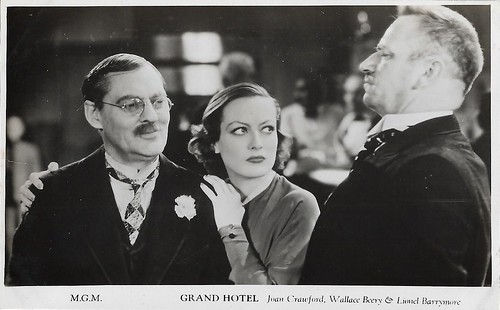
British postcard by Film Weekly. Photo: M.G.M. Publicity still for Grand Hotel (Edmund Goulding, 1932) with Joan Crawford, Wallace Beery, and Lionel Barrymore.
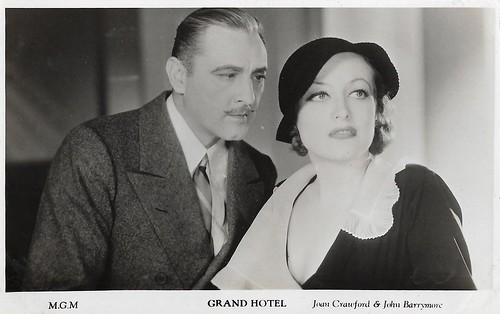
British postcard by Film Weekly. Photo: M.G.M. Publicity still for Grand Hotel (Edmund Goulding, 1932) with Joan Crawford and John Barrymore.
Sources: Mordaunt Hall (New York Times), Ron Oliver (IMDb), Richard Gilliam (AllMovie), Wikipedia and IMDb.

German postcard by Ross Verlag, no. 7244/1, 1932-1933, distributed in Italy by Casa Editrice Ballerini & Fratini, Firenze. Photo: Metro-Goldwyn-Mayer. Publicity still for Grand Hotel (Edmund Goulding, 1932) with Jean Hersholt.

German postcard by Ross Verlag, no. 7249/1, 1932-1933. Photo: Metro-Goldwyn-Mayer. Publicity still for Grand Hotel (Edmund Goulding, 1932) with Greta Garbo.

German postcard by Ross Verlag, no. 7285/1, 1932-1933. Photo: Metro-Goldwyn-Mayer. Publicity still for Grand Hotel (Edmund Goulding, 1932) with Greta Garbo and John Barrymore.
People come, people go. Nothing ever happens
The setting for Grand Hotel (Edmund Goulding, 1932) is Berlin's plushest, most expensive hotel. Lewis Stone plays Doctor Otternschlag, a disfigured veteran of World War I, usually drunk and a permanent resident of the Grand Hotel. He observes: "People coming, going. Nothing ever happens". His statement proves to be false, as the film follows several guests over the course of one tumultuous day.
John Barrymore is Baron Felix von Geigern, who squandered his fortune and supports himself as a card player and occasional jewel thief. He befriends Otto Kringelein (Lionel Barrymore), a lowly bookkeeper who is dying and has decided to spend his remaining days in the lap of luxury. Kringelein's former employer, industrialist General Director Preysing (Wallace Beery), is at the hotel to close an important deal, and he hires stenographer Flaemmchen (Joan Crawford) to assist him. She aspires to be an actress and shows Preysing some magazine photos for which she posed, implying she is willing to offer him more than typing if he advances her career.
Another guest is the eccentric Russian prima ballerina Grusinskaya (Greta Garbo), whose career is on the wane. When the Baron is in her room to steal her pearls and she returns from the theatre, he hides in her room and overhears as she talks to herself about wanting to end it all. He comes out of hiding and engages her in conversation, and Grusinskaya finds herself attracted to him. The following morning, the Baron returns Grusinskaya's jewels, and she forgives his crime. She invites him to accompany her to Vienna, an offer he accepts.
The Baron is desperate for money to pay his way out of the criminal group he had been working with. He and Kringelein get a card game going, and Kringelein wins everything, then becomes intoxicated. When he drops his wallet, the Baron stashes it in his pocket, intending to keep the winnings. However, after Kringelein begins to search for his lost belongings, the Baron – who desperately needs the money but has become very fond of Kringelein – pretends to have discovered the wallet and returns it to him.
As part of a desperate merger plan, Preysing must travel to London, and he asks Flaemmchen to accompany him. Later, when the two are in her room, which opens on to his, Preysing sees the shadow of the Baron rifling through his belongings. He confronts the Baron; the two struggle, and Preysing bludgeons the Baron with the telephone, killing him. Flaemmchen sees what happened and tells Kringelein, who confronts Preysing. He insists he acted in self-defense, but Kringelein summons the police and Preysing is arrested.
Grusinskaya departs for the train station, expecting to find the Baron waiting for her there. Meanwhile, Kringelein offers to take care of Flaemmchen, who suggests they seek a cure for his illness. As they leave the hotel, Doctor Otternschlag again observes, "Grand Hotel. Always the same. People come. People go. Nothing ever happens."

Dutch postcard, no. 357. Photo: Metro-Goldwyn-Mayer. Publicity still for Grand Hotel (Edmund Goulding, 1932) with Greta Garbo and John Barrymore. The subtitle mentions the German release title Menschen im Hotel, also the title of the book by Vicky Baum on which the film was based. The mark on the card is that of the Dutch Board of Film Censors.

Dutch postcard, no. 359. Photo: Metro-Goldwyn-Mayer. Publicity still for Grand Hotel (Edmund Goulding, 1932) with Ferdinand Gottschalk (Pimenov), Greta Garbo (Grusinskaya) and Rafaela Ottiano (Suzette).

Dutch postcard by JosPe, no. 381. Photo: Metro-Goldwyn-Mayer. Publicity still for Grand Hotel (Edmund Goulding, 1932) with Greta Garbo.
I want to be alone
Producer Irving Thalberg purchased the rights to Vicki Baum's novel Menschen im Hotel for $13,000 and then commissioned William Absalom Drake to adapt it for the stage. It opened on Broadway at the National Theatre on 13 November 1930 and ran for 459 performances. Pleased with its success, Thalberg had Drake and Béla Balázs write the screenplay and budgeted the project at $700,000.
Thalberg made it into MGM's first 'all star' film with an A-list of star performers: the divine Garbo, not one but two Barrymores, Wallace Beery, Joan Crawford, Lewis Stone, and with Jean Hersholt, Rafaela Ottiano and Ferdinand Gottschalk in sterling supporting roles. There was concern that putting so much talent into one film, instead of spreading the stars out over 4 or 5 films, would lose the studio money. But Grand Hotel (Edmund Goulding, 1932) was a great success, critically and financially.
Grand Hotel (1932) was seen as an artistic achievement in its art direction and production quality. The art director, Cedric Gibbons, was one of the most important and influential in the history of American film. The lobby scenes were extremely well done, portraying a 360° desk. This allowed audiences to watch the hotel action from all around the characters. It changed the way sets were made from that point onward.
Mordaunt Hall of The New York Times praised in 1932 the performances of Greta Garbo and John Barrymore, in a mostly positive review. "So far as the direction is concerned, Edmund Goulding has done an excellent piece of work, but occasionally it seems as though he relies too much on close-ups. Nevertheless he has sustained a steady momentum in darting here and there in the busy hostelry and working up to an effective dramatic pitch at the psychological moment. (...) Miss Garbo, possibly appreciating that she was supported by a galaxy of efficient performers, decided that she would do her utmost to make her role shine. And she succeeds admirably. She is stunning in her early scenes and charming in the love scene with Baron Geigern, portrayed by John Barrymore with his usual savoir faire."
More than 80 years later, Ron Oliver reviews at IMDb: "Watch how the plot weaves the threads of the characters' lives into a finished tapestry. One of the great movies. Tremendously satisfying." And Richard Gilliam at AllMovie adds: "Grand Hotel is the prototype for the all-star ensemble film and an excellent example of the rich and glamorous escapist entertainment, often from MGM, that took on enhanced prominence during the Depression. Produced by Irving Thalberg using top-end ingredients and state-of-the-art technology, it is yet another example of MGM's dominance during the 1930s for this type of film."
At the time of the shooting, there was some controversy about Greta Garbo, with her strong Swedish accent, impersonating the Russian dancer Grusinskaya, played on the stage by Eugenie Leontovich. She delivers the line "I want to be alone" and, immediately following, "I just want to be alone." Soon after, in conversation with Baron Felix von Gaigern (John Barrymore), she says "And I want to be alone." Referring to its legendary use as a characterisation of her personal reclusive life, Garbo later insisted, "I never said I want to be alone; I only said 'I want to be let alone.' There is all the difference.

British postcard by Film Weekly. Photo: M.G.M. Publicity still for Grand Hotel (Edmund Goulding, 1932) with Lionel Barrymore, Lewis Stone, and John Barrymore.

British postcard by Film Weekly. Photo: M.G.M. Publicity still for Grand Hotel (Edmund Goulding, 1932) with Greta Garbo and John Barrymore.

British postcard by Film Weekly. Photo: M.G.M. Publicity still for Grand Hotel (Edmund Goulding, 1932) with Joan Crawford, Wallace Beery, and Lionel Barrymore.

British postcard by Film Weekly. Photo: M.G.M. Publicity still for Grand Hotel (Edmund Goulding, 1932) with Joan Crawford and John Barrymore.
Sources: Mordaunt Hall (New York Times), Ron Oliver (IMDb), Richard Gilliam (AllMovie), Wikipedia and IMDb.
No comments:
Post a Comment